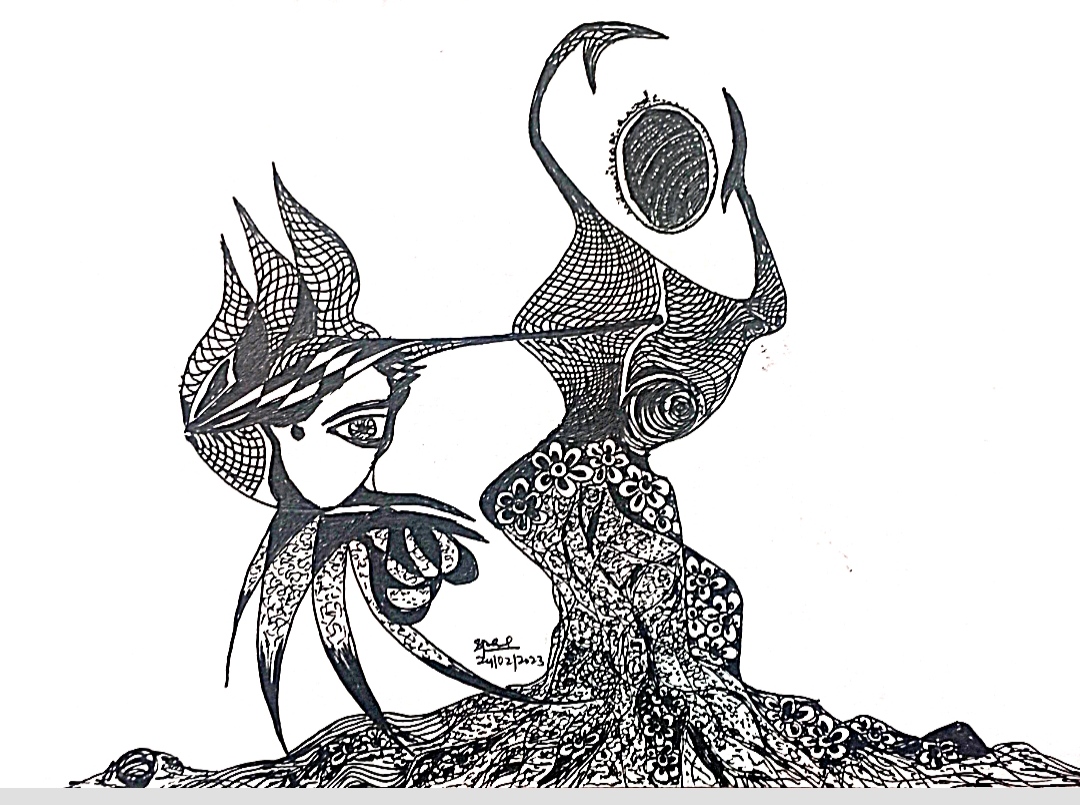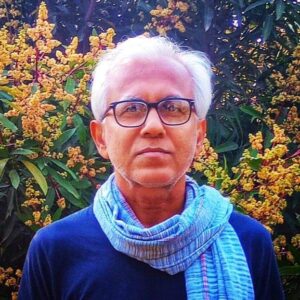
Poetry In Our Time

We are presenting three important poets in this issue. Habeeb Al-Samir is an important poet from Iraq. He writes in Arabic language. His Poetry has been translated in several international languages. His poetry gives the touch of Arabic culture. These poems are translated in to English. Maitreyee B Chowdhury is an English language poet/ writer, her poems are written in English. Kumar Mukul is a Hindi poet, writer; his poems have been translated in to English.
RS
Habeeb Al-Samir ( Iraq)
The Friends
Once I touched my fingers
And started counting them
A pertinent opportunity to count my friends
One of them Kept repeating more than once
While counting
And I repeat the counting
And he was repeated
Why are you more than one
On the tips of my fingers?
The dream dries
And the pouring rain on fingers’ fronts
Washes one friend.
Translated by: Dr Kadhim Al-Ali
The First Dance
Who ordered the fingers to hold to the tornado?
Or the glasses to timidly make her lose her face
Who replaced the face which is rooted in the shadow
With shreds of details and clots of light
As if they are images piling in the dark.
sea? the lips to open for the sweetness of words
In the midst of the clamour,
To obliterate the origin of absence
While the cloud is settled down in a place,
Attracted to a predestined dream
The fingers are like sensors
The fingers are invisible figures in the kingdom of moments
As if they are crawling toward the maps
They step to draw a lady’s figure surrounding herself with hands
As the fingers move in the dark to endow the light
Or to dictate the wind to pure what is left of the exhalation
In the room with its paint being shed on the marble
Our shadows were teased in a dance
The rhythm was escalated
Both bodies swayed, grappled
Her lips reached to my ears
Be kind to me, novice dancer
Tonight I am in your arms
Take me to your verdant forest
Where the grass is the God’s outstretched carpet
From one adoration to another,
Be kind to me while you surround every pore of me
Tonight’s dance is what’s left from our life
Don’t let your rhythm slow down
It’s indeed escalating
The pulse is increasing,
The desire is proliferating while you catch the air
You beside me, the dark is intensifying
And my body is swaying
Your respiring is passionate
And your perfume is the craziness of life
Contain me with a final kiss
Here I am withering in your arms
It is me who ordered the fingers to seize the shadow
And the glasses to spatter our features
In unrepeatable darkness
While our dance has just started
Translated by Miaad Hassan
It Looks Like
It looks like you
Do not know
How
To revolve
But
Around yourself.
The more you
Tried to
Stretch
Your hand
To catch
The rose
Of love sufferer
The more you
Find
Your hand
Stretch
Into
Nothingness.
How often you
Long to
See your eyes
Dreaming
For a young women.
Disturbing water
By the stone
Of the beach.
* *
*
It looks like you
Do not know
How
To fly
A little bit higher
Than your stature.
Whenever
You tried
To jump up
Above youself.
Your shadow
Catch you
* * **
It looks like you
Do not care
For the year
Of disappointment
And repeat
What you
Perpetrate,
Sometimes you
Identify yourself,
Surrounded
By darkness,
Dear the reckless
In debacles!
* * **
It looks like you
Wake up,
Stunned,
Gathering up
The remnant
Of the persistent
Day and
A green song
To give your heart
Little from
The book of light
And to
Look frequently
For you.
* * **
You look like to
Alternate
Your travels.
The poems are
Coasts of ink,
Letters that
Swim toward you
And others sink
Down
To the bottom.
* * **
It looks like you
Do not find
Enough space
To scream out.
None hears
The frequencies
Of your depression.
Then, you
Should mute
Your voice,
And wait
For your
Eternal scream.
Translated by Dr Hana Al-Bayyati
The Carob Husk
On the English cemetery fence,
the branches of carob join together
And on the way to Al-Rabat school,
students cram their bodies among the graves
The student who sneaked out of the first lesson,
steals his the first rose from the cemetery
The guard is alert
He sends a cry
The carob that is hanging in their white shirts
defines the impression of their chaos, lines painted on their tender bodies.
The time steals them,
while they enjoy picking flowers.
The night of the cemetery is intimidating
And they’re absent in the classroom
With his thick stick,
the teacher vows
The observer with big letters, writes the names of the absentees
The teacher begins the lesson,
The cemetery students are absent
The picture is being redisplayed
The marks of carob
The pointing carob thorns
Tangled
Plunged
Draws a picture of blood on their white shirts
The same familiar pathway
And in the brightness of dawn,
the cemetery gets up
The guard rubes his eyes
We stepped quickly
The classroom is cold
The hallway is cold
The lesson is cold
The observer counts the students
The teacher’s stick
The guard’s cry
Our bodies are like a drum
Off carob tree,
the sticks were,
the thorns were,
tangled in our shirts
Was it the curse of cemetery upon us, so we ask for forgiveness?
As we grew up,
each morning we pass by
No flowers in the cemetery
No guard at the cemetery
Even the dead,
there is no flowers commiserate their solitary
No guards that waters the grown cactus on their graves
The students no longer cram their bodies over there
The fence has faded, the graves were wrenched
And the carob remained alone, embracing the shades of the cemetery.
Translated by Miaad Hassan
Habeeb Al-Samir

Habib Al-Samir is a poet, editor and media person from Basra, Iraq. He completed his Bachelor’s degree in English Language. Habib Al-Samir is also a Member of the Writers Union in Iraq. His poems have been translated into several languages including English, Spanish, French, Serbian, Persian and Kurdish, and some of his books have been translated into French. He participated in Arab festivals and forums in Egypt, Lebanon, (Abu Dhabi), Syria, Tunisia, and other countries. Received numerous invitations from the Arab Maghreb countries and others.
The poet has released 11 literary books including Rain’s Fingers, 2012 and Soaring Without Wings / Critical Study in the Experience of Habib Al-Samar / by Critic Hamed Abdul Hussain Hamidi.
Maitreyee B Chowdhury (English- Bengal)
Termytomyces
A termite mound snaps open-
inside,
like Gaudi’s chambers of faith,
a colony of Termites sleep.
Come the holy month of Shravan,
within a fungus comb
the Termytomyces spreads new wings,
start new colonies,
make fertile, old Savana habitats-
Through vertical transmission
and an ant’s past-
fifty million years of growing together,
both fungus and termites
co-habit,
feed, copulate, rest-
wild food they become,
on our plates-
the Bharnda Chatu
* Termitomyces is a species of fungus which has a symbiotic relationship with termites. In India, worship of anthills (considered fertile), is common especially amongst the plain tribes in Central India. Savana lands in Africa is considered the origin of the species.
* Bharnda Chatu, local name of Termitomyces in Odhisa
In the Shade of the Mahua
Five kilos of Mahua flowers,
and three litres of Mahua bottles later,
Sixty-five-year-old Rambati surveys her ‘Fulli’ –
the purest spirit of them all.
Her nostrils flared; pupils dilated-
Rambati walks at night,
when the sky is a bottle of ink.
It is time now,
for the moha cha aalimb
that grows in the shade of the Mahua flowers.
She sings to them as she plucks,
dusting first with the Uskai branches,
paying homage to the snakes that lie within-
while the scent of Mahua penetrates.
In the month of Shravan,
just after the rains,
Santeri the termite hill goddess awakes again-
every sanctum sanctorum here, a termite hill holds,
the Termitomyces bloom within,
and Kshetrapala gods they become.
Consort to the cult of Santeri,
Renuka and Yellamma-
rituals must precede the plucking.
Tillers of the earth,
Rambati becomes mother- goddess,
the Roen, a poem-
a divine cult.
* Fulli- A local brew
* Moha cha aalimb– In Maharashtra, mushrooms are collectively called aalimb. Mushrooms that grow in the soil bed of the Mahua tree are moha cha aalimb.
* Mahua is an Indian tropical tree. The local drink made from this tree (an intoxicant) is also called Mahua.
Becoming the Boda
Deep in the forests of Bastar,
when lightning strikes,
and the rains fall-
the flowers on the Sal disappear,
the Boda they become.
As the rains fell-
like Fungi I grew
past childhood,
and into a magical sixteen.
My thighs now fleshy,
harbinger of the witch’s blood,
into the sacred web of womanhood
I mushroomed-
grew in bulk,
and perished.
Under the Mahua,
both life and death are fragrant-
only the promise of magic,
and its remains, flower.
*Boda (scientific name: Astraeus hygrometricus), is a species of fungus found in the Bastar region of Chhattishgarh. The fungus has a symbiotic relationship with the decayed Sal tree leaves and earth.
Maitreyee B Chowdhury
 Maitreyee B Chowdhury is a poet and writer. She has four books to her credit, The Hungryalists, One Dozen-Hasan Azizul Huq (Trans), Uttam Kumar and Suchitra Sen- Bengali Cinema’s First Couple and Where Even The Present Is Ancient: Benaras. She is editor of The Bangalore Review, a literary journal. Maitreyee’s forthcoming work is centered around the eccentric genius poet Binoy Majumdar. Her interest areas are in mapping migration related stories from the North East of India, and ethnomycology.
Maitreyee B Chowdhury is a poet and writer. She has four books to her credit, The Hungryalists, One Dozen-Hasan Azizul Huq (Trans), Uttam Kumar and Suchitra Sen- Bengali Cinema’s First Couple and Where Even The Present Is Ancient: Benaras. She is editor of The Bangalore Review, a literary journal. Maitreyee’s forthcoming work is centered around the eccentric genius poet Binoy Majumdar. Her interest areas are in mapping migration related stories from the North East of India, and ethnomycology.
Kumar Mukul (Hindi)
Translated by Shivam Tomar
The River and the Bridge
Even when the river runs dry,
a bridge remains a bridge.
A river of sand is still called
a river.
As long as this bridge exists,
the river perseveres,
awaiting the change in season.
Patches of Moonlight
As I gaze at the moon,
I find myself unable to determine whether
I am happy or sad. Frustrated by this uncertainty,
I approach a child standing nearby and inquire
about the moon’s whereabouts. Initially, the child
searches for his own shadow and then points to the sky.
He then gestures towards the illuminated patches
of moonlight on the ground,
leads me to the realisation that as we speak of the moon,
we essentially refer to things immersed in the moonlight.
Sadness
Amongst so many playful memories
Where shall I place
This sharp diamond of your sadness.
Morning
Unveiling the moonlight’s mysteries,
Dawn emerges. Wake up,
with dew and dust on your feet,
embark on a journey. Witness
the world, though memories hold
night jasmine at its peak. It
may have grown weary from
its nightly vigils. Appreciate
and preserve its fragrant essence.
Wake up, while dogs sleep,
birds soar to new horizons.
Wake up and enter the dreams of children
Politician
The notion of change appears distant and superficial,
They seem unaffected by even the strongest fears.
They claim familiarity with the Gita’s teachings,
Yet remain willing to harm their own populace.
They possess a keen awareness of your helplessness,
they know when you feel like laughing, your only refuge
is the shield of sarcasm.
Kumar Mukul

Kumar Mukul, born in 1966, holds a Master’s degree in Political Science. He has had a versatile career spanning over three decades, starting as a faculty member at Amaan Women’s College in Patna in 1989. Later, he transitioned into journalism, holding various roles at Amar Ujala & Rajasthan Patrika. Kumar has also published six collections of poetry, including “Hindustan ke 100 Kavi” and “Ved Vedang, kuchh Notes”.

